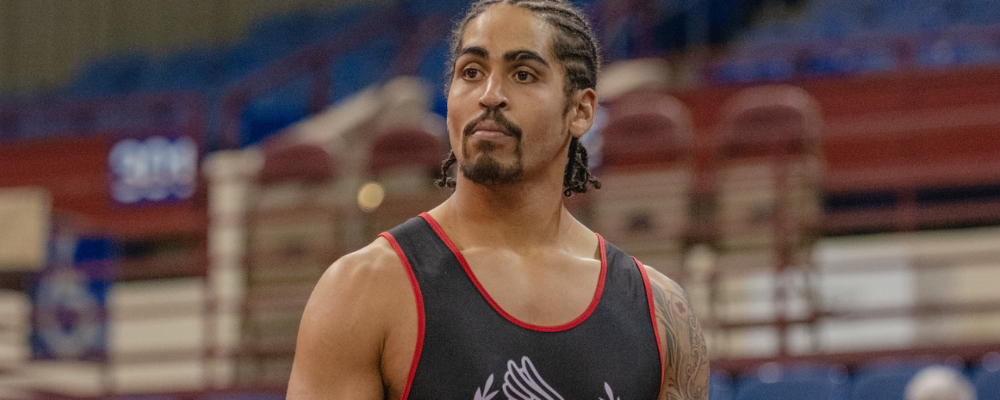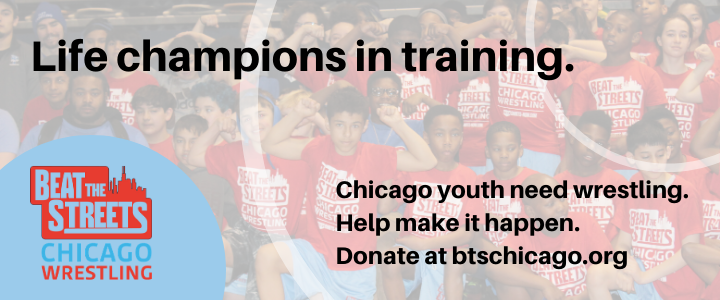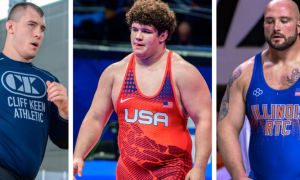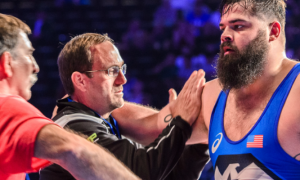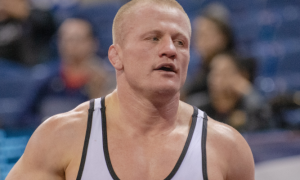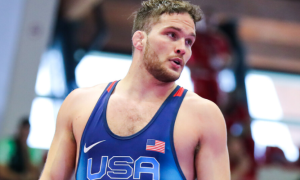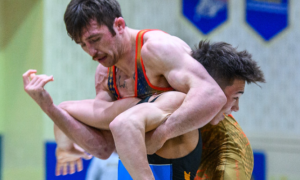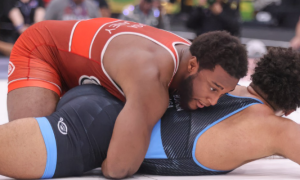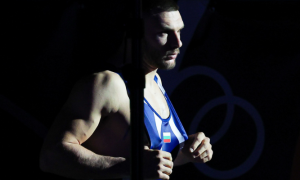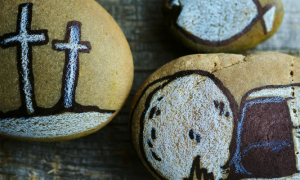The human brain was not designed to embrace confinement. Yet, after a while, the mind settles into a groove. Habits form. Expectations appear before vanishing. Panicked questions are asked inwardly. No answers will ever arrive from the self, but still the requisite pleas have to be made. Echos of anguish soon fill the cranial rafters. Like a carnival funhouse beholden to sinister undertones.
Lock yourself in a room. Four walls adorned by a few paintings which hang by loose wires. Just visual reminders of what it is you are chasing — and from what it is you’re trying to escape. After a while, those walls take on a life of their own. It feels like they are beginning to close, gradually narrowing your perception until the images on display become distorted and disturbing, taunting your attempts to make sense of the abstracts.
But you can’t. You are not supposed to. There is no reasoning with unreasonable thoughts. Either sit on the floor with your arms wrapped around your knees waiting to be swallowed into the vortex, never to be heard from again; or, take a breather, reassess, and then start smashing each and every section of sheetrock until all the studs are exposed. And as soon as they are, and your eyes spot daylight, the promise of grace, relief, and an opportunity to freely roam the now-expansive landscape are more than enough to fuel every proceeding adventure.
Still, that first step over the debris requires a moment of pause. It takes some trust. One foot tenuously leads the other before an unencumbered stride even becomes discernible.
Marcus Finau (87 kg, NYAC) needed a minute.
It had all happened so fast. Hawaiian-born Finau — big, strong, and with eyes as wide as saucers — came awfully close to a collegiate scholastic career until former Northern Michigan assistant Willie Madison intervened and extended an invitation to Marquette. This was a decade ago. Somehow, Finau adjusted to life in the Upper Peninsula’s harsh climate enough to continue blossoming into a viable athlete. He made the Junior World Team in 2011. And again in ’12. Then, Finau exited NMU in favor of moving out west to the US Olympic (and Paralympic) Training Center in Colorado Springs. After that, he found himself in the Senior World Team Trials final opposite Caylor Williams, who was just beginning his run as a dominant force.
So, that is two Junior World Teams, a few solid placings in National tournaments, and an appearance in a World Team Trials best-of-three series within three years of finishing high school. Finau’s resume was building as quickly as his confidence. And the next season, when Finau wound up a step or two short of reaching the same plateau, no one really thought much of it because competition at the highest level is, in fact, very difficult, and breakthroughs are not an automatically assumed proposition. He was still quite young. There was plenty of time. It seemed like an inevitability.
But what they didn’t know, and for which they failed to account, is that inside, Finau was spent. Burnt.
The walls had closed in.
He had been through a lot in a compressed period of time and committed himself fully to the cause. There was never a slow-down. There was never enough space to just draw a breath and retrace the steps. Finau reconsidered his education, taking advantage of the chance to attend classes and at long last sit down for a moment’s peace. Meanwhile, the sport moved on without him. Because it does and always will. Waves still break after surfers reach the sand.
What pulled Finau back in on a full-time basis this past fall was not the idea that had a world had forgotten about him. The attraction of the “Olympic Year” helped, but it also wasn’t the main nudge back towards wrestling. A realization occurred. The simple act of recalling how and why this journey first began was more than enough for Finau to experience a surge of motivation. His body, remade; his attitude, refocused. A fresh perspective along with a deeper desire to succeed were all he really had, but that was plenty.
5PM Interview with Marcus Finau
5PM: Let’s start with Hawaii since you’re an outlier. How did you become introduced to and interested in Greco coming from Hawaii?
Marcus Finau: I wrestled for two years when I was younger. My dad took me into the room, I didn’t like how the singlets fit, thought they were too hauole. So I decided not to do it. I played ball a lot growing up, since I was four or five-years-old. That was the direction as far as sports and athletics went. I think it was about my sixth or seventh grade year when I kind of changed gears. They wanted me to do more than just play football. I was kind of a heavy guy so I mixed in wrestling. I tried basketball and baseball for a minimum length, but then my seventh grade year it was wrestling.
I did fairly well my intermediate year and then I moved up to JV (junior varsity) really quick, and then to varsity my freshman year. People were looking at me like, Oh, this guy’s a wrestler. And then my senior year, I broke my hand or something, and decided to take the year off. For me, when I went into football that following year it had stressed me out. I felt like I had taken a year off of wrestling. When I went to go wrestle, I ended up finishing out of the states. Like, pretty badly. I was projected to win it and then I bombed out, wound up sixth or seventh place. My junior year I kind of did the same thing. I put all the calculations together for my senior year. Coming from my school, they didn’t even have a state champ. Not until 2010, and they were hoping for one for I don’t know how many years. That was a big accomplishment for me. Doing it as an individual, that hooked me.
My junior year we had the Nationals out at Fargo. Honestly, I didn’t make my Greco decision until my last two months before college. I had letters from schools to play football in college. I looked at my parents like, Alright, I’m going for wrestling. We argued and argued (laughs). But at the end, they said, If this is what you want to, do it. I was supposed to go to Lindenwood. I signed a four-year full ride.
But at the Nationals, I think I placed fourth at Fargo, and Willie Madison ran up to the mat telling me that I looked really good in Greco. He asked me how long I was doing it. Two or three years, that’s it. Willie gave me this packet. I went back to the dorm room, threw the packet on the ground, ate, and didn’t think anything of it (laughs). I called my parents that evening to tell them how it went. They told me, Don’t be signing anything, you’ve got a four-year scholarship. I had went to Annapolis (the US Naval Academy) for a visit, too, and there was another school. In about two or three weeks, I was supposed to go home, get my stuff, and go to Lindenwood. Within that week I came back from Fargo, we changed all my flights and I wound up in Northern Michigan. Nine months after that, I was on the Junior World Team.
5PM: I know enough about Hawaii to know that it is full of athletic, tough combat sport athletes.
Finau: Oh yeah, there are a lot of fighters out there. You have all of these Polynesian islands and these boys grow up playing rugby, fighting in the streets. We’re not above gun violence, but there are some big boys and we do fight out there.
5PM: Do you look at Hawaii as I do from a distance, how it seems like an untapped resource for Greco in the US?
Finau: Oh, 100%. 100%. For me, I never knew about the Super 32’s. We were just talking about it the other day with some of the guys out here. They got to go to this tournament in Tulsa, that tournament… I knew about Reno, I did go to Reno. But the exposure isn’t there. For whatever reason, no one wants to take a trip out to Hawaii. But it’s worth it. Look at the size of these guys. Look at the NFL. We are so under shown as an island because people will be like, Why don’t you come back to the island and play ball, or do wrestling? Well, we don’t have an NFL team, and if you look at a lot of these NFL teams, a lot of Polynesian boys are out there playing all over the country. Not just the NFL, also rugby. And, combat sports. I have friends fighting in the UFC from the island, kids I went to high school with who thought we would just be wrestling for the rest of our lives.
5PM: A Hawaiian guy then ends up at Northern Michigan…
Finau: It’s cold (laughs). My mom told me about North Face. I said that I don’t need a jacket. Oh my goodness, it was cold.
5PM: How long did it take to adjust?
Marcus Finau: You know, I never got adjusted to Michigan, to be honest (laughs). I mean, it’s beautiful. I saw beautiful things and I have beautiful memories from being in Michigan. I will say that Michigan is a part of my life that will always be a part of my life from now until the day I die.
But for me, I never really got adjusted. I was training during my first semester, I was there for the cold, we traveled, I went on my first tour. Then after that I went to the Junior Worlds, after that it was summertime and I went back to Hawaii for that summer to go see my family because I had been traveling. The following year I did the same thing again, and by my third year I had moved out to Colorado already.
So, Northern Michigan was very short-lived but it was a very good stepping stone, though. A huge stepping stone. I will say that I am very thankful for having been in a room with Aghasi Manukyan, who passed away. He single-handedly had me run through an exercise or two that literally put me into the top-3 at Nationals that year. God rest his soul, that man was a monster. I was sad that I was a year or two short on Ivan (Ivanov). Our paths almost crossed this year a couple weeks back. Northern Michigan was awesome. It was a big stepping stone. I was kind of done with warm weather for a little bit, done with sunshine for a little bit. I grew up for 18 years with nothing but blue skies, sunshine, the water. Rain was our snow. When I saw snow and actually got to be in the cold, it was exciting, you know?
5PM: You make Junior World Teams and then right away you began performing at the Senior level. That does not always happen, sometimes it takes a while. For you at this time of your life and career, were you surprised that it happened so quickly? Or did you just figure that you were on schedule?
Finau: I knew that I was ready. In my room I had Robby Smith, who was a #1 or #2 guy, RC Johnson, who was in the room with me. I had Pete Gounaridis… All these guys were no chumps and at least three or four years older than me. I had already, lack of a better term, rattled their cages. I knew I was okay and fine to be competing on the Senior level.
But looking back with hindsight at 20/20, I could have better used that time as a University athlete and maxed out my experience there first. I would have definitely stayed in the Senior bracket, but I think I made a leap and didn’t have everything aligned that I needed to. Was it the wrong choice? No, plus you can’t go back. But definitely with hindsight being 20/20, I’ve had athletes — at Senior, Universities, Junior — ask me and I always say Take your time. There’s no rush.
Sometimes at the University level it is going to be easier but those matches can help you break through at the Senior level. Because at the Senior level, there is no time for mistakes, whereas at the University level, you can get by with some strength and some speed, and also technique. But in the Senior bracket, especially overseas… I mean, that’s one of the reasons why I cut (down to 87 kilos). I’m not worried about guys inside the country. I know everyone inside the country, I’ve trained with everyone inside the country. But it is going overseas and wrestling Azerbaijan and Russia and being able to perform against these guys. It’s an expensive ass trip (laughs). You don’t want to take an expensive trip and just get beat up (laughs). I’m trying to go back to Cuba or Moscow and be smiling walking out.
5PM: Right, there is not really a prolonged grooming period for Greco. Wrestling isn’t structured the way boxing is, where you come up and go against a string of opponents either at your level or even below, and then when you’ve run up your record you begin contending for a title shot. At the same time, you in short order did appear in a Senior World Team Trials finals.
Finau: When you talk about accomplishments, for me, I kind of bury that and compartmentalize that into a box. And that box just pisses me off. But it is a marker and I can always say that I was #2 in the country — which is a big accomplishment. There is only one ahead of you. But as an athlete, you always joke around about how if you would be good with silver.
One of the coaches at the (Olympic and Paralympic) Training Center, TC (Dantzler) says that a lot, how the one thing about Americans is that we have become okay with just making it to the Olympics. And it’s true. Why do you just want to make it to the big events? Don’t you want to go and then walk out smiling? Coaches always joke about it, but don’t you want to be able to pop a bottle of champagne and pour it into a World Cup? Aghasi Manukyan used to say that. That’s when you’re ready to have a drink. When you have a World cup, then you’re ready to have a drink.
That is the feeling, and I had that feeling by winning the states. That was just a little taste. Just going up to Juniors and winning the Nationals, that was cool. Then University, then Seniors… That second place, it was great, it was cool. But it wasn’t what I wanted. It made me hungry, but at the same time it made me realize that I had to do some things on my side. It’s a great accomplishment and the difference between first and second is just a little bit. That’s just straight up.
5PM: In the aftermath of falling to Caylor Williams in ’13, which started his run and I’m not sure he even took a loss to a US guy after that for a few years — were you completely overcome with disappointment, or were you encouraged?
Finau: Oh, I was encouraged, for sure. At the time, in the immediate aftermath, I was discouraged, just like anyone would be after a loss. But it definitely encouraged me. Looking back at it, it’s like, Okay, what would I have done if I won the Trials? Would I have done well at the Worlds? Would I not have done well at the Worlds? I mean, being honest with myself and knowing where I was… Now, I’m excited, but where I was then was a little rocky. Looking at it now, I use it as a driving force and see it as excitement — and only excitement.
A lot of people didn’t know I was coming back for the Nationals in December. But it wasn’t about a lot of people, it was about me. The sport is now about me. As athletes, that is what it boils down to. You have to be a little selfish in this sport.
Looking at it through the whispers and meeting people and talking to people, you have a guy come up and say, Oh, I know you, you’re that dude who wrestled a couple years back. I’m just thinking about how, in a way, I’m an older guy now, which I’m fine with. But then it’s like, You took second at the World Team Trials, right? And that to me was a stepping stone. It’s a big stepping stone, and that is what I treat it as.
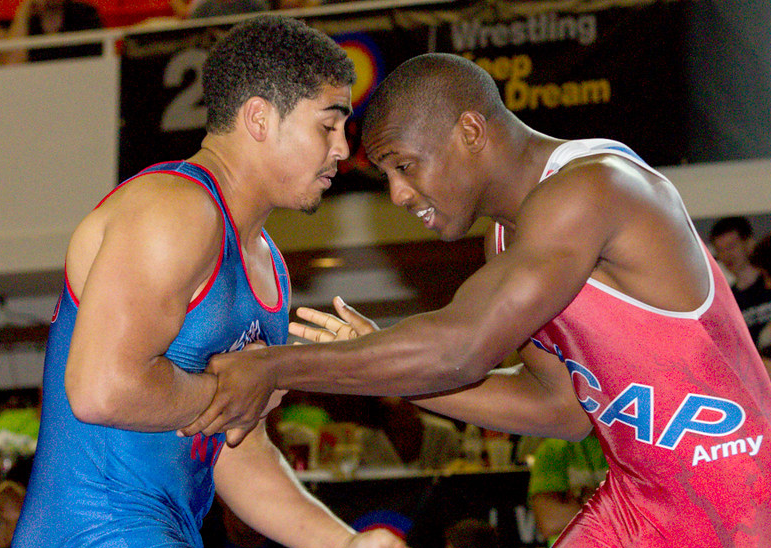
Finau (blue) was just a fresh-faced 21-year-old when he met up with Caylor Williams in the finals of the 2013 World Team Trials finals. (Photo: John Sachs/TechFall)
5PM: In 2014, you took fourth and fourth between the Nationals and World Team Trials. You figure at this stage, you’re about three or four years into being a full-timer. What are you saying to yourself after that season, especially because it wasn’t too long afterwards when you decided to make a change in what you were doing?
Finau: I think by then the truth was that I was burnt out. Honestly, I was burnt out. I just didn’t have my mind and everything else aligned, if that makes sense. That was a big one for me. I think I had stopped driving the car myself. With that said, I decided to change it up. I had started at Northern Michigan for school and now we’re at Year 3, a year and a half in (at the OTC), and it was time to remember the first reason, which was college. Sports were always on the side unless they were paying the bills.
So I decided to go back to school. Actually, I was presented with an opportunity to go back to school. That was where I met Mike Roumph, who was an assistant coach at Colorado State-Pueblo. He was helping plug some of the Olympic Training Center guys into college if they wanted to do that. So I went there for another year, year-and-a-half. I am actually waiting for a response to re-enroll so I can finish up my last 14 credits.
I decided to go there to knock out some credits and get my mind… I mean, my mind was still on wrestling because I was wrestling with them, but I needed to kind of get away from the Training Center and figure out what I was doing. That didn’t really work, going back to college. The school was good. I helped out a lot of the athletes and I had an amazing time going back. But we were so twisted up training here and training there. You were so tired that you didn’t get to just go outside. That was one thing Momir (Petković) got me into, and a lot of these coaches. You have to be able to experience the place. Slow it down. Go fish, go find a lake, go do something that is going to remind you that you were there and not just training and throwing up, your shoulder is sore, your neck is sore.
It takes a lot of energy; but at the same time, when you sit back and finally relax, those are the things that I can tell you I remember. Like Romania, Bulgaria, Austria. Going out with these people, doing these things and experiencing these things. Sitting in the back of an international hotel in Cuba, smoking a Cuban cigar and having a drink. You remember the history of where we were at, who we were with, and what was happening. I was fortunate to experience that.
5PM: I think it’s important you used the term “burnt out” because it seems like sometimes athletes are afraid to say it that way.
Finau: 100%. I calculated it. I had been on a good run and I had to run it by my family. And we’ll say some “professionals” helped me understand that you have to take it in and reward yourself when you can. I was on a good run. From my sophomore year until two, three years into college. So a good six or seven years I was on fire. Anyone will tell you that it’s hard to peak for two to three months as an athlete. So for me peaking for four or five years? It was alright to extinguish that. Even coming back to this camp, I think the rest was good.
5PM: There is no Greco-Roman college in and around where you grew up. Then you go to NMU, the Upper Peninsula, and it becomes a whirlwind. You were successful quickly. It sounds like your brain needed a reset. But when this happened, this “burn out” phase, were you cognizant in the moment that’s what this was?
Marcus Finau: No. No. As an athlete, to be honest, I’m a fighter. Wrestling teaches you that if you can’t get this, you shift to that; and if you can’t get that, you shift to this. We find a way. But I was so focused on the goal. It’s like no matter how hard you press the gas, if everything in the car isn’t strapped in correctly, things are going to fall apart. That is in a nutshell kind of how it is.
I had to figure out things on this side and that side. Athletes — I mean, everybody — sometimes, you just need to take a second. Take a breath. People living vicariously through me, too. What are you thinking about when you come within one shot of going to the World Championships? Train, train, train, train, train (laughs). It’s like, You just have to train a little bit harder! You’re right there! Train, train, train. No — sometimes you have to take a step back and that’s the hardest thing. As an athlete who is older now, I can see it. If you had talked to me three or four years ago about slowing down, I didn’t even know where the brake was. And that’s not a bad thing. You see these athletes at this level. You have to believe some unreal sh*t for some unreal sh*t to happen.
Mike Tyson was talking about how he was into The Art of War. That was his mindset. You have coaches, you have people who inputting on you everyday to be this, to be that, to be this. You realize that if I tell you everyday that you are this monster, this killer? It’s a brainwash. I am not saying it’s a bad brainwash. But as athletes, sometimes it’s hard. That is why it’s good some of us have families and good friends. I try to be that influence now, too. But sometimes we need a coach to say, Alright, you need to chill. That goes back to that whole personal level thing.
5PM: There are a good amount of older retired guys who feel that the athletes of today are too reliant on their coaches. Do you agree or disagree with that assessment then?
Finau: I disagree. You shouldn’t depend on your coach 100%. Your coach is there, he’s in the circle and there to tell you one or two things that he can see from the side, and he’s there in case you have a mental lapse. The moves and techniques are so fast that once you step on the mat, that’s between y’all. But when it comes to planning stuff, getting to tournaments, and understanding that you may have athletes who like to listen to music too loud in the back of the building and just being like, Come inside — that stuff should be expected out of a great coach.
I have seen great coaches. I have yelled and got mad at great coaches (laughs). And I’ve come back and said “sorry” to great coaches. I’ve been on both sides of it. I’ll just say Momir. A great coach. Hands down. He’s a technician, very in-tune with the athletes. I’m sure if we asked ten people, 90% of them are going to say one thing, and one out of the ten are going to say another. That’s just bias in who you talk to. But I can definitely say that athletes shouldn’t depend on their coaches; however, coaches should understand that they need to be depended on more than some of them allow themselves to be.
5PM: What was the first or main catalyst for you deciding to come back? I shouldn’t be entirely presumptuous but I imagine the Olympic Year didn’t hurt.
Finau: It kind of goes into a weird story on my side of things. It was the second time I was going back. I made a decision. It was like, Why did I go to Colorado? It was for training. I was dating a girl at the time, and this girl I had been with for the last four or five years. She was a big part of my life. She moved to Hawaii with me and we moved back to Colorado together. And I think that I was just taking the steps in this life and growing into the man who I am working on becoming everyday, and that I am at the same time.
I had been training for the last three years, I would say. Not hard training, you know? Go to the gym and do what I could. Let’s just say that I was at a point in my life where I’m an athlete who was the #2 guy in the country and I let my body slip to where I made a promise to my family that I would never let myself get there again. I was just training everyday. I moved to Colorado and kind of reached out to the OTC guys. Slowly but surely I rekindled my connection with the Army guys. They were like, If you want to come wrestle, you can come wrestle at the Army. The Army was pretty open. I had to of course get my facilities pass at the Training Center because I hadn’t been around in a long time. I’m not on the National Team, so I called my sponsors back, NYAC. They answered the phone and I think they were surprised to hear from me. I called one of my old school coaches, Coach Nick. Always a good guy, though.

In his first Senior Greco event in four years — and in his 87-kilogram debut — Finau (top) went 4-2 at the 2019 US Nationals last December, good for 7th place. “I let the nerves get to a little bit in that second match (against Dylan Cowan, red), but moving forward I won’t let that happen again,” Finau says. (Photo: Richard Immel)
After that I started the see the individuals around me. I don’t know, I just made a decision last year. With the Olympics, of course, that was the big move. It was like, Come back. Worst case scenario, you fall short of the Olympics. It still sets you on fire for the next four years. And to be honest, I was excited. I get these nerves. I keep forgetting that it’s excitement but that is only because I haven’t been around in so long. I called my sponsor and they told me about Nationals. They said they would see me at the tournament, so I was going to put on a little show. But where I was then to where I am now? I’m growing everyday and just getting better. I let the nerves get to me a little bit in that second match, but moving forward I won’t let that happen again.
5PM: 87 kilograms is a very, very deep weight for the US — as much now, if not more so than ever, and that includes 2017. Prior to coming back, did you keep up with 85/87 kilos?
Finau: I was definitely paying attention. I had seen Patrick Martinez, Joe Rau. I knew who they were very well. I could say they are good friends of mine. I know who they are. I wrestled Joe I think back in the day, and Martinez I never wrestled but I knew him when he first came to the OTC from college. Jon Anderson, I know very well. There are other guys, too, but I had my eyes on him (Anderson) going into the Nationals. Losing at the Nationals, and you can’t sleep on anyone, but that’s why I say life has been pretty weird. It has kind of been aligned.
But I looked at this weight class and it’s like, Who keeps winning at NYAC (Bill Farrell Memorial)? Oh, his name is Alan Vera. Oh, okay. (laughs). To me, that was eye-catching because I know who these guys are. Nothing against Joe. He’s a strong wrestler and I wrestled him in Oklahoma a couple of weeks back. He has a great coach, too (Bryan Medlin). But at the end of the day, talent is talent. If you just look at the tournaments and how these people won, hands-down Alan Vera is sitting in a top-3 spot. Just having the opportunity to train with him here in Nebraska has been huge. Strong guy. We throw each other. He got on my ribs, I got on his ribs.
It is what it is. It’s mental warfare everyday. We all have Instagram, we all have social media. We would be ignorant to not be using YouTube and looking at each other. I can be honest about it. I know that I am competing to get to that #1 spot, and if God forbid someone beats me, that guy better become a gold medalist at the Olympics. I am fighting to earn a gold medal at the Olympics. I’m not just fighting to make it to the Olympics. That’s what it is.
Follow Marcus Finau on Instagram to keep up with his career and competitive schedule.
Listen to “5PM38: MWC Wrestling Academy’s Zac Dominguez” on Spreaker.
SUBSCRIBE TO THE FIVE POINT MOVE PODCAST
iTunes | Stitcher | Spreaker | Google Play Music

Notice: Trying to get property 'term_id' of non-object in /home/fivepointwp/webapps/fivepointwp/wp-content/themes/flex-mag/functions.php on line 999

